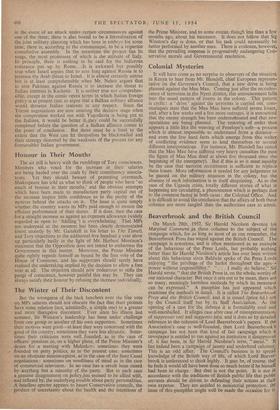Beaverbrook and the British Council
On March 28th, 1952, Sir Harold Nicolson devoted his Marginal Comment in these columns to the subject of the campaign which, for as long as most of us can remember, the Beaverbrook Press has waged against the British Council. The campaign is notorious, and is often mentioned as an example of the behaviour of the Press Lords, but probably nothing better than Sir Harold Nicolson's article has ever been written about this behaviour- since Baldwin spoke of the Press Lords enjoying "the privilege of the harlot throughout the ages-- power without responsibility." " . . . I really do believe.- Sir Harold wrote, " that the British Press is, on the whole, worthy of our national character. But once it sets out to be mean, there are so many, seemingly harmless methods by which its meanness can be expressed." A pamphlet has just appeared which examines the methods in detail. It is called The Beaverbrook Press and the British Council, and it is issued (price 6d.) not by the Council itself but by its Staff Association. As the opening of a case for the defence it is formidably cool and well-marshalled. It alleges case after case of misrepresentation, of suppressio yeti and suggestio falsi, and it does so by detailed reference to the columns of Lord Beaverbrook's papers. If the Association's case is well-founded, then Lord Beaverbrook's campaign has not been that kind of fair campaign which a newspaper is entitled to run against an institution it disapproves of; it has been, in Sir Harold Nicolson's term, "mean." It has indeed been a campaign of jaunty and underbred calumny. This is an odd affair. The Council's business is to spread knowledge of the British way of life, of which Lord Beaver- brook is understood to think highly. It may be, of course, that he feels it would all have been done so much better if he himself had been in charge. But that is not the point. It is not ill accordance with the traditions of British public life that public servants should be driven to defending their actions at their own expense. They are entitled to ministerial protection; the issue of this -pamphlet might well be made the occasion for it


































 Previous page
Previous page